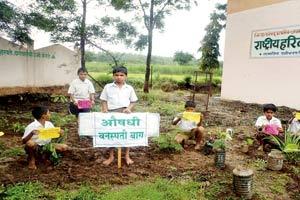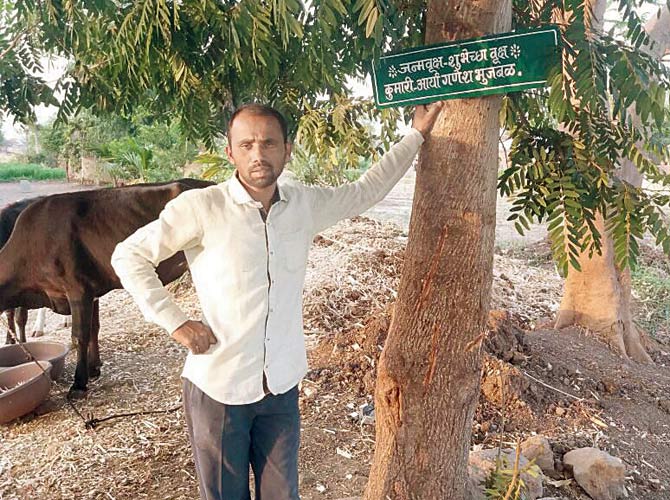Trees have solved all their problems, said the villagers. Now, they have water through the year, and enough fruit and vegetables to feed everyone. Trees have even managed to put an end to open defecation that was once rampant here


Schoolchildren plant medicinal saplings at the village
ADVERTISEMENT
Khed: Looking at the green fields and orchards spanning across Ranmala, it's hard to believe the village used to be a drought-ridden dust bowl just 18 years ago. Back then, the villagers had very little water, and even less money to buy food. Everything changed after they started planting trees.
Trees have solved all their problems, said the villagers. Now, they have water through the year, and enough fruit and vegetables to feed everyone. Trees have even managed to put an end to open defecation that was once rampant here.

Ganesh Bhujbal had planted this tree to mark the birth of his daughter
Hailed by State
Even the Maharashtra government took note of Ranmala's success story in a Government Resolution (GR) issued on March 16, hailing it as an example for the rest of the state. The state's mission is to plant 33 crore trees by 2019, for which it has instructed all municipal corporations, as well as rural development department and district-level administration to adopt Ranmala's measures.
Ranmala's 1,900 residents give all the credit for their prosperity to former teacher and sarpanch Popat Tukaram Shinde, 74. It was his brainchild to start tree plantation as a way to mark special occasions. Since 2000, whether it's a wedding, the birth of a child or a death anniversary, the villagers have marked the event by planting a sapling.
Many issues, one solution
While this green movement has changed the face of the village forever, the former teacher had initially started out with the simple aim of drawing more students to empty classrooms. Shinde told mid-day, "Before, four to five villages depended on a single well for water. There was no farming and children would not turn up at school."
Shinde used his money and knowledge to connect nearby rivers and draw their water to the village in 1997. They then needed a solution for all the wastewater, so Shinde dug 44 large pits where all the sewage was collected for treatment. To ensure that no one fell into these pits, Shinde planted trees there. "Then we noticed that people were defecating in the open. Even the path to the temple was riddled with faeces. I decided to plant saplings along the road, and soon, there was no more open defecation there," he said.
In 2003, he was elected sarpanch and he concentrated his efforts further. "We started with the census initiative in the village. Every year, we would ask new parents to plant a tree in their yard to celebrate the birth of their child. When these birthday trees got good response, we started with other initiatives such as 'maherche jhad', which is planted by the parents of a bride. After she goes to her in-laws home, they continue to look after the tree like their daughter. We also have tree plantations for married couples or for any happy occasions. We plant neem, coconut, and fruit trees like mango, jambul, tamarind, chickoo, berries, etc."
With such heavy foliage in the region, the 650-hectare village also gets abundant rainfall — enough to cultivate plenty of bajri, jawari, groundnut, okra, potato, onion and leafy vegetables. Deputy sarpanch Mohan Sukale, 30, said, "I have seen this village transform from a barren land to lush greenery. Now, we have plenty of water, sewage treatment facilities and the villagers even earn income by selling fruits from the trees."
'Proud to be recognised'
Ganesh Bhujbal, farmer
'Our coconut, chickoo and mango trees are like family members. I had planted a tree when my daughter was born and she planted one later as well. Now she is married, but one third of the fruits go to her'
Mohan Sukale, deputy sarpanch
'I have seen this village transform from a barren land to lush greenery. In 17 years, we have planted 1.97 lakh trees. We had done it to help ourselves, but it is a proud moment to be recognised'
Raghunath Naikade, chief conservator of forest (social), Pune
'This village has set an example for the state. We are organising a lecture series by the villagers about their achievement'.
Also Read: For Punekars, Sundays Are About Giving Trees A Painless Life
Catch up on all the latest Mumbai news, crime news, current affairs, and also a complete guide on Mumbai from food to things to do and events across the city here. Also download the new mid-day Android and iOS apps to get latest updates
 Subscribe today by clicking the link and stay updated with the latest news!" Click here!
Subscribe today by clicking the link and stay updated with the latest news!" Click here!






